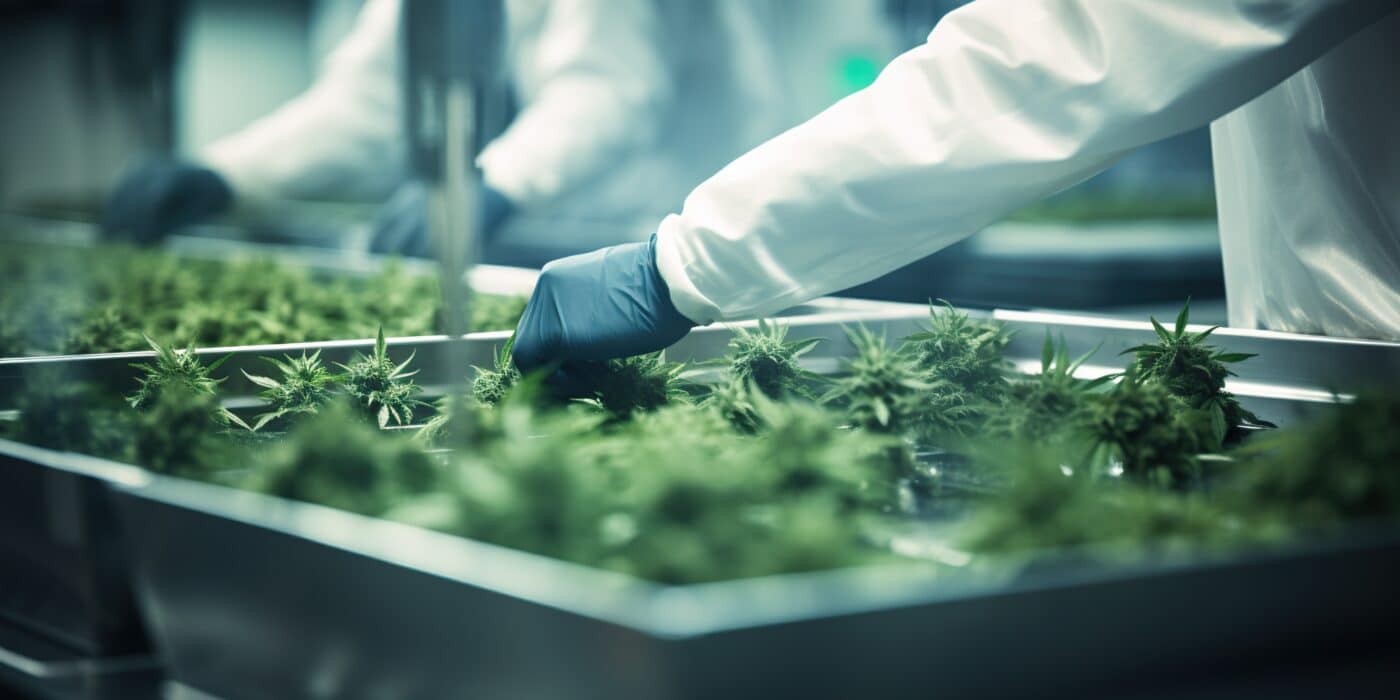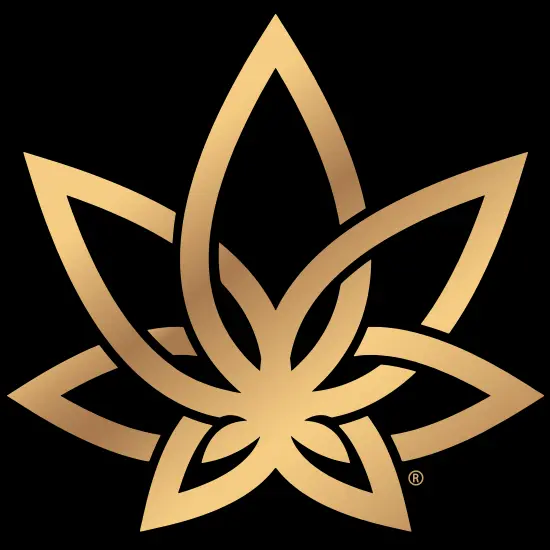Delta 8 THC
From Plant to Pleasure: A Journey into Delta 8 Production
Particularly in the hemp industry, the spotlight has increasingly turned towards Delta 8 THC, a compound that has captivated the interest of experienced cannabis enthusiasts. From Delta 8 production to its potential effects and benefits, Delta 8 THC has become a household name in the world of cannabinoids.
This fascination stems not only from Delta 8’s unique properties but also from the innovative methods employed in its production, its legal standing, and its interaction with the human body. As a leader in the creation of hemp-derived products, we at 3CHI are at the forefront of exploring and harnessing the potential of Delta 8 THC, along with many other novel cannabinoids produced from the cannabis plant.
Today, however, we’re sticking with Delta 8 production, highlighting what Delta 8 THC is, potential benefits and safety concerns related to it, how it interacts with the body, and the legalities around it.
In an industry full of bad actors, we’re here to warn consumers of such and ensure they have the most pure, consistent, and effective Delta 8 products on the market.
Delta 8 THC Production – from Cannabis Plant to Finished Product

At the heart of Delta 8 production is a sophisticated process that begins with the cannabis plant. Unlike its more famous counterpart, Delta 9 THC, Delta 8 is not found as abundantly in nature.
It is typically manufactured through a chemical synthesis process that transforms CBD, a non-psychoactive compound extracted from hemp cannabis raw extracts, into Delta 8 THC. This transformation is achieved through a method known as isomerization, where CBD molecules are rearranged to produce Delta 8 THC.
This process underscores the importance of starting with high-quality, naturally occurring CBD to ensure the purity and efficacy of the final product.
Achieving Purity and Safety
Given the chemical process involved in producing Delta 8 THC, ensuring the absence of potentially unsafe household chemicals and other potentially harmful by-products is paramount.
At 3CHI, we take this responsibility seriously. Our Delta 8 products undergo rigorous in-house and third-party testing to screen for heavy metals, contaminants, and other potentially harmful substances. This dual-layer testing protocol is crucial for identifying and mitigating significant public health concerns, including adverse events and serious health risks associated with unsafe contaminants.
Having this level of testing ensures that we don’t operate within any uncontrolled or unsanitary settings, reducing the chance of accidental exposure to potentially harmful by-products created from the making of such cannabis products. From the starting raw material to the final product being sold online, we like to ensure a quality-controlled environment with not just our Delta 8 products, but every one we produce.
Additionally, the role of Delta 8 THC as a component responsible for eliciting unique effects compared to other cannabinoids highlights the importance of its production process.
Unlike Delta 9 THC, which is directly extracted from cannabis plants, Delta 8 requires this additional step of chemical conversion, showcasing the innovative approaches within the cannabis industry to cater to consumer demand for diverse and novel experiences.
Interaction with the Endocannabinoid System
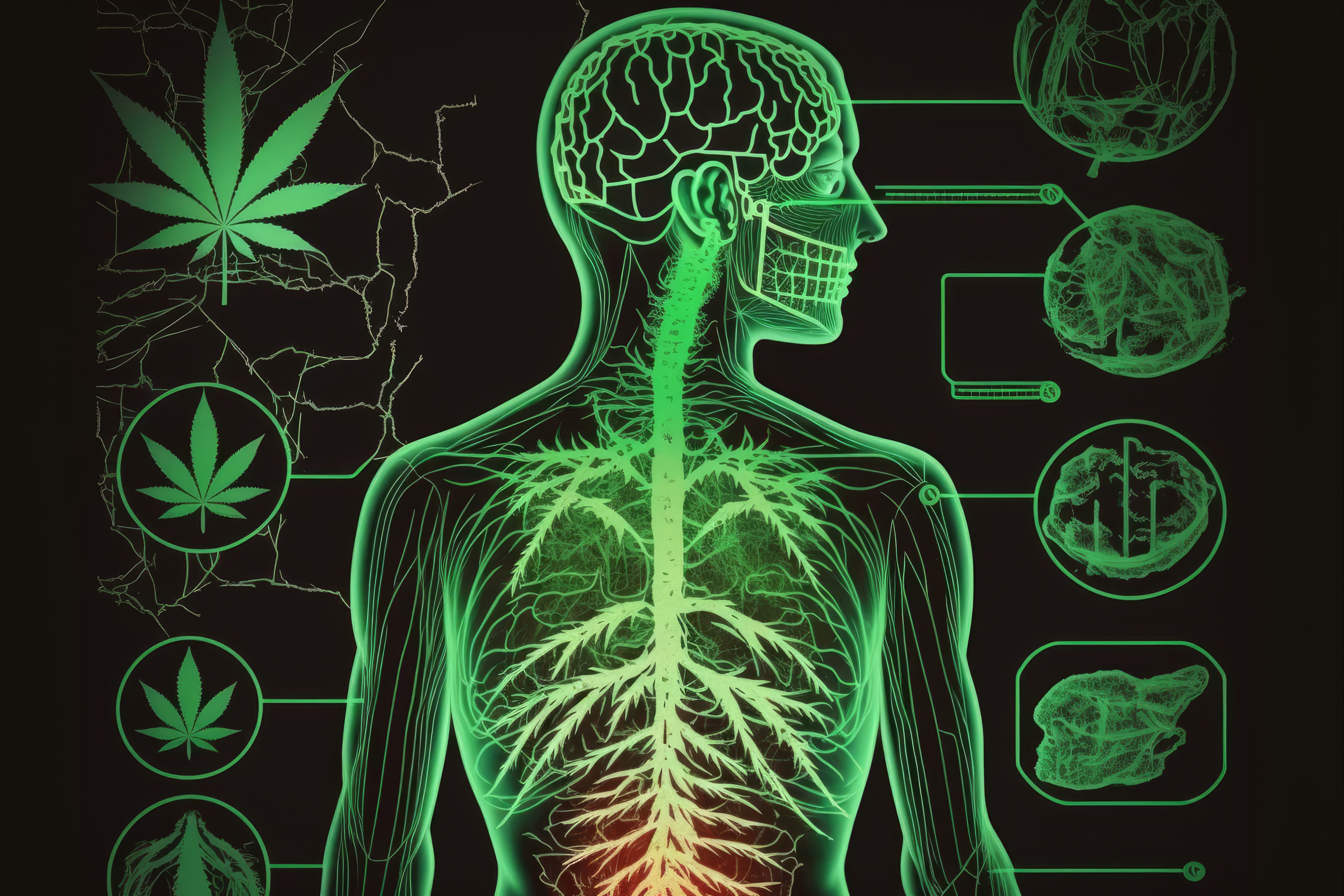
The interaction of Delta 8 THC with the human endocannabinoid system (ECS) is a focal point of interest due to its unique effects compared to other cannabinoids. This system, integral to maintaining bodily homeostasis, consists of cannabinoid receptors scattered throughout the body, including the brain, organs, and tissues.
Delta 8 engages with these receptors, CB1 and CB2, in a manner that is both fascinating and complex, leading to its distinctive profile of effects.
The Potentially Psychoactive Part
Delta 8 THC’s affinity for the CB1 cannabinoid receptor in the brain is thought to be the component responsible for its psychoactive properties. However, it binds to these receptors in a slightly different fashion than Delta 9 THC, which may explain why Delta 8 is reported to produce less intense psychoactive effects.
This nuanced interaction suggests that Delta 8 might offer a more manageable and less overwhelming experience, making it an appealing option for those sensitive to the stronger effects of Delta 9 THC.
Wellness with the CB2 Receptor
Furthermore, Delta 8 THC also interacts with the CB2 receptors located throughout the body, contributing to its potential to influence physical sensations and possibly support a sense of relaxation and well-being.
This interaction with both types of cannabinoid receptors underscores the versatile nature of Delta 8, as it appears to bridge the gap between the psychoactive effects traditionally associated with THC and the more subtle, body-focused effects often attributed to CBD and other cannabinoids.
In essence, the interaction of Delta 8 THC with the endocannabinoid system pays homage to the compound’s unique place within the spectrum of cannabinoids. Its ability to engage with cannabinoid receptors in a distinct manner offers a glimpse into the potential for Delta 8 to provide a different kind of experience for users, one that balances psychoactive effects with a more pronounced sense of bodily relaxation.
As research into Delta 8 and its effects continues to evolve, so too will our understanding of its potential applications and benefits.
Potential Benefits and Risks
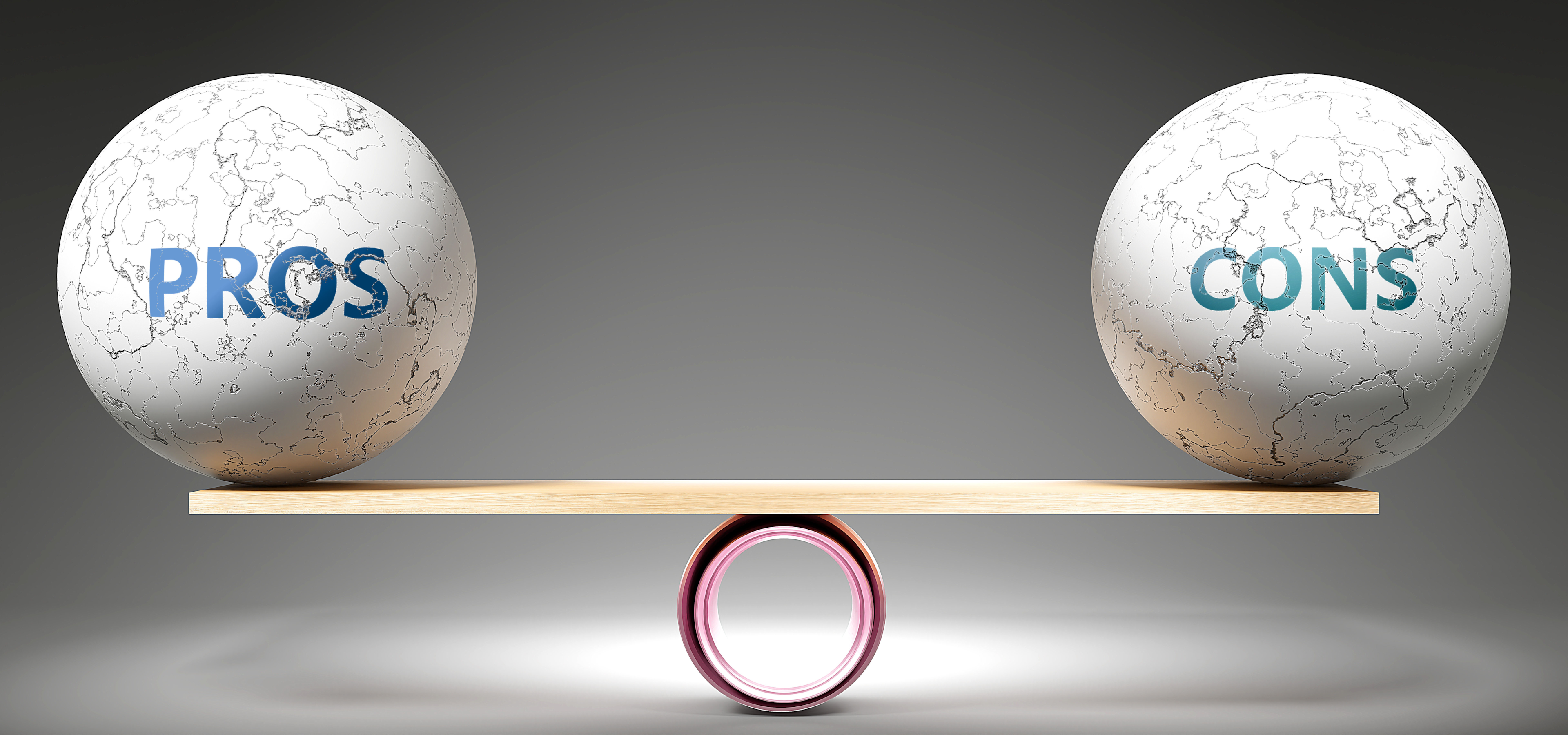
While the discourse surrounding Delta 8 THC often highlights its unique position within the cannabinoid spectrum, it’s crucial to navigate this conversation with a balanced understanding of both potential benefits and associated risks.
The allure of Delta 8 lies in its intoxicating effects, which users report as being less intense than those of Delta 9 THC, potentially offering a more manageable experience that still encompasses the hallmark sensations associated with THC.
The Upside
The potential benefits of Delta 8 THC have piqued interest in its application for integrative health practices. Anecdotal evidence suggests that Delta 8 may contribute to a sense of calm, enhance mood, and possibly aid in managing discomfort.
However, it’s important to approach these claims with caution, as they remain unproven treatments within the scientific community. The landscape of cannabinoid research is still evolving, and while Delta 8 shows promise, definitive conclusions about its efficacy and applications are yet to be drawn.
Nothing is Risk-Free
On the flip side, the growing popularity of Delta 8 has led to concerns over deceptive marketing practices and the selling unapproved products. Some products on the market may not accurately represent their cannabinoid content or claim benefits that are not supported by scientific evidence. This not only misleads consumers but also poses risks to public health, especially when products are not subjected to rigorous testing for purity and potency.
The issue of having FDA regulated products violate regulations comes into play when Delta 8 THC products are marketed with therapeutic claims that have not been evaluated or approved as such, potentially categorizing them alongside controlled substances in terms of regulatory scrutiny.
Moreover, the legalities surrounding Delta 8 THC—where it occupies a legal gray area between hemp-derived products and controlled substances—complicates the regulatory landscape. This situation underscores the importance of consumer vigilance. Individuals interested in exploring Delta 8 should prioritize products from reputable sources that provide transparent lab testing results and adhere to legal standards to ensure safety and compliance.
While Delta 8 THC offers intriguing possibilities within the realm of cannabinoid-based experiences, it is accompanied by a set of considerations that cannot be overlooked. The balance of potential benefits against the risks of unproven treatments, deceptive marketing, and the complexities of navigating a product that exists in a legal and regulatory limbo demands informed decision-making from consumers.
Legal Landscape of Delta 8 THC
The legal landscape surrounding Delta 8 THC is as dynamic as it is complex, shaped by an intricate interplay between federal directives and state-level regulations. The Agriculture Improvement Act (also known as the 2018 Farm Bill) has set the stage for hemp-derived products. This includes Delta 8, to be distinguished from marijuana, allowing for legal production and sale, provided they contain less than 0.3% Delta 9 THC.
Even with Delta 8 being legal according to federal law, the nuanced nature of Delta 8 THC, especially considering its psychoactive and intoxicating effects, has prompted a more cautious approach from regulatory bodies.
Adding to this complexity is the involvement of federal and state partners, including the Drug Enforcement Administration (DEA), which monitor the market for emerging cannabis-derived products. Their oversight extends to ensuring that Delta 8 THC products comply with existing legal frameworks, particularly concerning their psychoactive properties. This scrutiny is part of a broader effort to navigate the challenges posed by cannabinoids that straddle the line between legality and controlled status.
Further Oversight
State responses to Delta 8 THC have varied significantly, with some states imposing stricter regulations or outright bans, reflecting concerns over safety, regulation, and the compound’s intoxicating capabilities.
This patchwork of state-level policies creates a challenging environment for both consumers and producers of Delta 8, necessitating a keen awareness of and adherence to the specific legal context of each jurisdiction.
Moreover, considerations such as age limits play a crucial role in the legal discourse surrounding Delta 8 THC. Regulatory bodies and lawmakers are increasingly focused on protecting minors from accessing products with psychoactive and intoxicating effects, leading to the implementation of age restrictions for purchasing Delta 8 products.
These measures are indicative of the broader regulatory efforts aimed at ensuring public safety while accommodating the growing interest in and availability of Delta 8 THC and similar compounds.
For stakeholders in the Delta 8 market, staying informed and compliant with these evolving legal standards is paramount, underscoring the importance of vigilance and responsibility in navigating the complexities of cannabinoid legality.
The Power of Cannabis Plants
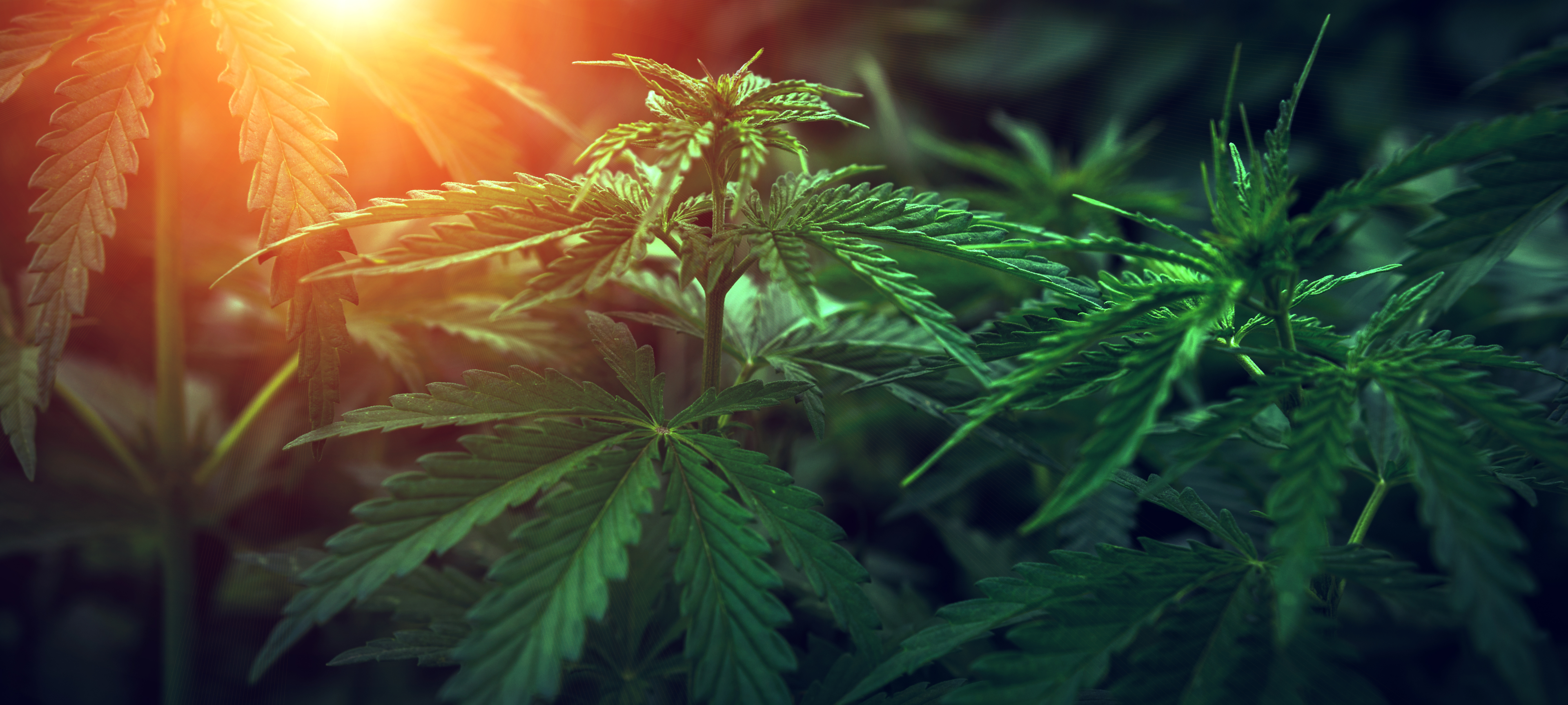
The journey of Delta 8 THC from a lesser-known compound to a prominent player in the cannabis industry underscores the evolving landscape of cannabinoid research and consumer interest. As a derivative of the cannabis sativa plant, Delta 8 THC represents a fascinating intersection of legality, science, and wellness, offering a unique profile as a psychoactive substance found within hemp products.
At 3CHI, our commitment to advancing the understanding and availability of Delta 8 THC is driven by a dedication to purity, consistency, and efficacy. We strive to expose consumers to only the highest quality products, meticulously tested to meet stringent standards. This commitment is particularly crucial in an era where online marketing can often lead to misinformation or unsubstantiated therapeutic claims.
Our goal is to provide a reliable source for consumers seeking to explore the benefits of Delta 8, ensuring that every product purchased online or in stores meets our high expectations for safety and quality.
In this dynamic context, 3CHI remains at the forefront, dedicated to exploring the potential of Delta 8 THC and other cannabinoids, always with an eye towards innovation, safety, and the well-being of our consumers.
As we look to the future, we are excited about the possibilities that Delta 8 THC and the broader cannabis industry hold, committed to leading the way with integrity, transparency, and a deep respect for the plant that started it all.
To stay updated on all things cannabis and 3CHI, sign up for our newsletter here!
When you do, you get 5% off your first order and a free pack of gummies!
